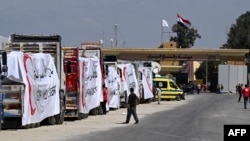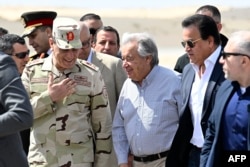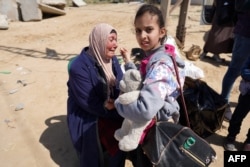During a visit to the Rafah crossing Saturday, U.N. Secretary-General Antonio Guterres said blocked aid to Gaza is a “moral outrage.”
“Here from this crossing, we see the heartbreak and heartlessness of it all. A long line of blocked relief trucks on one side of the gates, the long shadow of starvation on the other,” Guterres said.
“That is more than tragic. It is a moral outrage,” he said.
In his remarks, Guterres called for an immediate humanitarian cease-fire and urged Israel to allow “total, unfettered access” for humanitarian goods throughout Gaza.
Rafah offensive
The secretary-general’s visit comes as Israel threatens to launch a major military operation in Rafah, where the majority of Gaza’s displaced population are now sheltering.
U.S. Secretary of State Antony Blinken is among those urging Israel to not attack Rafah. Blinken met with Israeli Prime Minister Benjamin Netanyahu on Friday in Tel Aviv to discourage an assault on the southern Gaza city.
“It risks killing more civilians. It risks wreaking greater havoc with the provision of humanitarian assistance. It risks further isolating Israel around the world and jeopardizing its long-term security and standing,” Blinken said after his meeting with Netanyahu and his war Cabinet.
But Netanyahu said Israel didn’t need U.S. support to attack Rafah.
“I also said that we have no way to defeat Hamas without going into Rafah and eliminating the rest of the battalions there. And I told him that I hope we will do it with the support of the U.S., but if we have to — we will do it alone,” Netanyahu said in a statement.
More than a million Palestinians are sheltering in Rafah, many of them after fleeing other parts of Gaza to try to find safety amid the war.
Cease-fire talks
Blinken's meeting with Israeli officials in Tel Aviv on Friday came as efforts continued to secure a six-week cease-fire between Israel and Hamas in exchange for the release of hostages seized in the October 7 terror attack. The threat of a potential invasion of Rafah cast doubts over the talks.
The U.S. made a proposal Saturday at the talks in Qatar to try to close the gap between the sides on how many prisoners Israel would release for every hostage Hamas releases — if a truce is reached.
Hamas announced Saturday that an Israeli hostage has died, it said, due to “lack of medicine and food.” Israel generally does not comment on these announcements.
The U.N. Security Council on Friday failed to call for a cease-fire in Gaza after Russia and China vetoed a U.S.-drafted resolution supporting a halt to the fighting. This was the seventh time the council failed to agree on a cease-fire resolution since the war started in October.
A Security Council vote on a cease-fire alternative is set to take place Monday morning.
Al-Shifa raid
As Israeli officials consider a military operation in Rafah, Israeli forces continued their days-long raid on al-Shifa Hospital in Gaza City. Israeli forces have killed more than 170 gunmen during the raid, which began Monday, the military said Saturday.
Hamas and the Islamic Jihad, both U.S.-designated terrorist groups, said they were fighting Israeli forces in the vicinity of the hospital but deny being inside the sprawling compound.
The military has previously described the raid as an effort to “thwart terrorist activity.”
But five of the wounded Palestinians at the hospital have died, the Hamas-run Gaza Health Ministry said in a statement Saturday. The hospital has no water, food or health services due to the siege, the ministry said.
The Israeli military moved patients to a designated space in the hospital and unloaded 2 metric tons of food and 3 metric tons of water, the army said.
Medical staff and Hamas reject that the hospital is used for military purposes or to hide fighters.
Hamas' October 7 terror attack inside Israel triggered the war, killing about 1,200 people. Israel's subsequent counteroffensive in Gaza has killed nearly 32,000 Palestinians, according to the Gaza health ministry.
Delivery of humanitarian assistance has been difficult, and a U.N.-backed food insecurity report said last week that more than 1 million Palestinians are at risk of famine in the coming weeks.
Some information in this report came from Reuters and Agence France-Presse.















